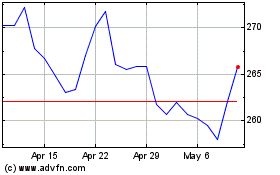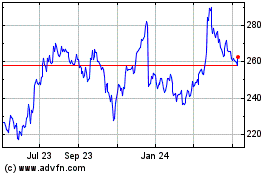FedEx Takes Earnings Hit Following Cyberattack -- Update
September 19 2017 - 8:09PM
Dow Jones News
By Ezequiel Minaya and Michelle Ma
FedEx Corp. said Tuesday that a cyberattack earlier this year
dented earnings in its latest quarter by roughly $300 million,
prompting the package delivery giant to cut its profit forecast for
the rest of the fiscal year.
The company said that the June 27 attack, which security experts
dubbed Petya, dragged on per-share earnings by 79 cents, reduced
its quarterly earnings by a third, as its computer systems at its
TNT Express business were disrupted for weeks. The company said it
has restored most of TNT's services and critical technology, but it
is still working on some customer-specific systems.
"This was not an ordinary cyberattack," FedEx's finance chief,
Alan Graf, said during a conference call with analysts. "We believe
that this attack was the result of a nation-state targeting Ukraine
and companies that do business there."
The company expects TNT systems damaged by the attack to be
fully restored by the end of September.
FedEx, which wasn't covered by cyberinsurance, said it is
"re-examining where the market is" and is considering adding
coverage, Mr. Graf said. The company said the attack was contained
to TNT and didn't impact FedEx Express systems or its
customers.
FedEx shares fell 1.6% to $212.55 in after-hours trading. They
were up 16% so far this year.
FedEx acquired TNT Express last year for $4.8 billion, the
largest acquisition in FedEx's history as part of a move to
accelerate its growth abroad.
FedEx expects integration of the Dutch company to be finished in
2020. Integration expenses, including restructuring charges, are
expected to be about $800 million, with $350 million of that
expected to be incurred fiscal 2018.
Like rival United Parcel Service Inc., FedEx is making
preparations for the surge in holiday shipments from the boom in
online shopping, which has tested the two package-delivery giants.
Executives said Tuesday they expect to hire 50,000 employees for
the peak holiday season, about the same level as last year.
The company said it would also add surcharges on "the small
number" of large retail and e-commerce customers that drive the
surge on peak deliveries. It is also charging extra fees for
oversize packages for the entire holiday season. UPS announced
earlier this year plans to apply surcharges on all shipments on
certain peak-volume days.
For the fiscal first quarter ended Aug. 31, FedEx reported a
profit of $596 million, or $2.19 a share, down from $715 million,
or $2.65 a share, a year ago. It said the cyberattack reduced
per-share earnings by 79 cents in the period. Revenue rose 4% to
$15.3 billion.
The company lowered its profit targets for the rest of the
fiscal year. It now expects per-share earnings, excluding certain
items, to be between $12 and $12.80, down from its previous
estimate of between $13.20 and $14.
Starting Jan. 1, FedEx said it would FedEx Freight, Express,
Ground and Home Delivery shipping rates in the U.S. would increase
by an average of 4.9%.
Write to Ezequiel Minaya at ezequiel.minaya@wsj.com
(END) Dow Jones Newswires
September 19, 2017 19:54 ET (23:54 GMT)
Copyright (c) 2017 Dow Jones & Company, Inc.
FedEx (NYSE:FDX)
Historical Stock Chart
From Mar 2024 to Apr 2024

FedEx (NYSE:FDX)
Historical Stock Chart
From Apr 2023 to Apr 2024
